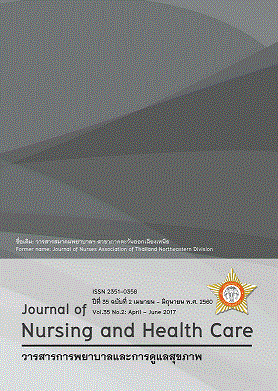บริบทการทำงานของพยาบาลไทยในภาคตะวันออกเฉียงเหนือ Nursing Practice Environments in Northeast Thailand
คำสำคัญ:
บริบทการทำงานเชิงบวก การพยาบาลไทย nursing practice environment, Thai nursing personnelบทคัดย่อ
บทคัดย่อ
ทั่วโลกรวมทั้งประเทศไทยเกิดภาวะวิกฤติการจ้างงานของพยาบาล สภาการพยาบาลสากลจึงเสนอให้มีการพัฒนาบริบทการทำงานเชิงบวกสำหรับพยาบาลเพื่อให้พยาบาลมีสุขภาพดี มีอัตราการคงอยู่สูง เพิ่มผลผลิตการทำงานและความผาสุกของผู้รับบริการ การวิจัยเชิงคุณภาพแบบพรรณนานี้ (Qualitative descriptive exploratory study) มุ่งประเมินและวิเคราะห์บริบทการทำงานเชิงบวกของพยาบาลในภาคตะวันออกเฉียงเหนือ ศึกษาใน 4 โรงพยาบาล โดยการสัมภาษณ์เชิงลึก การเสวนากลุ่ม การสังเกตแบบมีส่วนร่วมและการประชุมระดมสมอง มีผู้เข้าร่วมวิจัยคือพยาบาลวิชาชีพ 240 คน ศึกษาระหว่างเดือนเมษายนถึงสิงหาคม พ.ศ. 2557
ผลการวิจัย พบว่า พยาบาลส่วนมากมีความภูมิใจในการงาน ได้รับความรัก ความเอื้ออาทรจากผู้ประกอบวิชาชีพด้วยกัน สนใจร่วมประชุมแลกเปลี่ยนเพื่อพัฒนางาน ทุกโรงพยาบาลเปิดโอกาสให้พยาบาลเลือกทำงานในหน่วยที่สอดคล้องกับความชอบและความสามารถ มีการให้แสดงความจำนงในการย้ายหน่วยทำงานทุกปี มีการจัดเวรผสมผสานความสามารถในทุกระดับ จึงเป็นการอยู่ร่วมกันแบบถ้อยทีถ้อยอาศัย โรงพยาบาลจัดสรรอุปกรณ์และเครื่องมือการทำงานเพิ่ม อย่างไรก็ตามทุกโรงพยาบาลพบสภาพแวดล้อมในการปฏิบัติงานยังไม่เหมาะสม หอพักพยาบาลไม่พอ มีอุบัติการณ์ติดเชื้อจากการทำงานเพิ่มขึ้น โดยเฉพาะวัณโรค เนื่องจากสภาพการจัดเตียงในหอผู้ป่วยที่แออัดและความไม่สะดวกในการใช้หน้ากาก N-95 มีรายงานการถูกเข็มทิ่มตำ และพยาบาลป่วยด้วยโรคเรื้อรัง การถูกผู้ป่วยทำร้ายร่างกาย มีความไม่ปลอดภัยขณะนำส่งผู้ป่วย และสวัสดิการด้านการเจ็บป่วยไม่เหมาะสม มีภาวะวิกฤติการดูแลจากจำนวนพยาบาลไม่เพียงพอ มีการลาออกของพยาบาลใหม่ ที่ทำงานครบ 1 ปี ร้อยละ 50 และพยาบาลที่ทำงานครบ 25 ปี ที่ไม่มีการเลื่อนตำแหน่งจากพยาบาลชำนาญการ บางหน่วยงานย่อยมีบรรยากาศองค์กรไม่เอื้อต่อการทำงาน ขาดความมั่นคงในชีวิตการทำงาน ได้รับค่าตอบแทนที่ไม่เป็นธรรม พยาบาลจึงต้องการปรับบริบทการทำงานเชิงบวกในโรงพยาบาล ขอตั้งกรมการพยาบาล เพื่อกำหนดตำแหน่ง และพัฒนาจนเป็นระดับเชี่ยวชาญ เพิ่มค่าตอบแทนหลังการศึกษาและการอบรมเฉพาะทาง และพิทักษ์สิทธิ์แก่พยาบาลทุกคนอย่างทั่วถึง งานวิจัยนี้จึงเสนอแนะให้ทุกโรงพยาบาลมีการประเมินบริบทในการปฏิบัติงานของพยาบาล ส่งเสริมการทำวิจัยและโครงการในการพัฒนาบริบทในการทำงานของพยาบาล และพัฒนาสมรรถนะพยาบาลในการ ส่งเสริมบริบทการทำงานเชิงบวกในสถานที่ปฏิบัติงาน
Abstract
At present, there is an increasing nursing personnel shortage worldwide, including in Thailand. Subsequently the International Council of Nurses (ICN) has augmented a positive practice environment (PPE) policy to improve nurses’ health, increase nurses’ job retention and productivity, and enhance clients’ quality of life. This qualitative descriptive exploratory study was undertaken during April and August 2015 with the aim to evaluate and analyze the context for positive practice environment of registered nurses (RN). Data collection was carried out through in-depth interviews, focus group discussions, participatory observations and brainstorming. Research participants were 240 RNs from four hospitals in Northeast Thailand.
Results indicated that most nurses were proud of their jobs. Nurses felt the love and caring from other nurses in their workplace. They frequently met and exchanged thoughts and ideas to improve job qualities. All four participating hospitals had an open policy for nurses to move to other units that suited their competencies and preference every year. Every nursing shift was arranged to have a mixed-skills nursing personnel so nurses could share the expertise and assist one another. Every hospital provided equipment and materials adequate for routine nursing intervention. However, nurses of all four hospitals reported somewhat negative practice environment. There was inadequate housing for nursing personnel, and an increasing trend of infectious disease transmission from work especially tuberculosis because of congested bedding within the wards and the non-user friendly nature of the N-95 mask. In addition, nurses also reported incidences of needle sticks, got ill with chronic diseases, patient assaults, unsafe conditions while referring patients, and inadequate healthcare benefits when they got sick. More importantly, there is a crisis in nursing personnel shortage in all four hospitals. Half of new RNs resigned from their jobs within one year of recruitment. Senior nurses who had worked for 25 years or longer were not promoted to higher positions. There were conflicts within some units that obstructed work atmosphere and nurses felt insecure about their jobs. Lastly, many nurses felt they were underpaid for their positions. As a result, nurses tried to create a positive practice environment in their respective hospitals. They proposed to establish the Department of Nursing within the Ministry of Public Health that will be responsible in establishing new or more positions for nurses with higher competencies, granting increased salary when nurses receive additional training or education, and advocating and protecting nurses’ rights at work. It is recommended from this study for every hospital to evaluate their nursing practice environment, encourage more research and projects that enhance nurses’ work context and increase nurse’ competencies in promoting positive practice environment.


